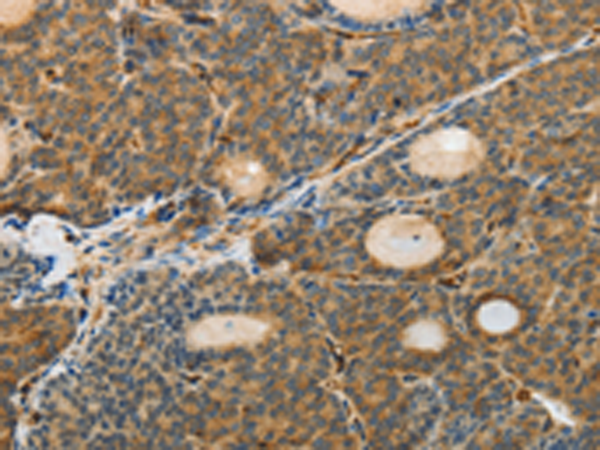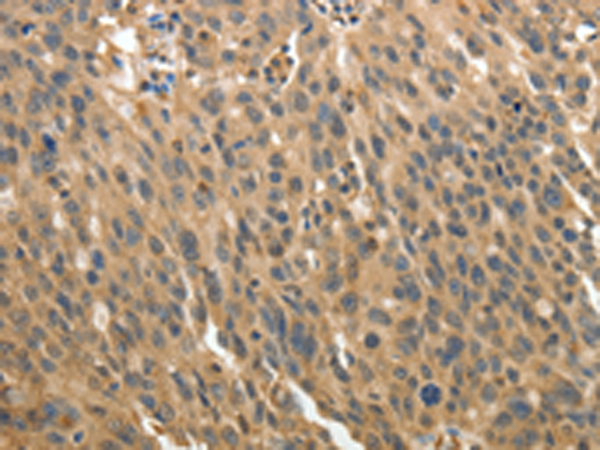


| WB | 1/500-1/2000 | Human,Mouse,Rat |
| IF | 咨询技术 | Human,Mouse,Rat |
| IHC | 1/50-1/200 | Human,Mouse,Rat |
| ICC | 技术咨询 | Human,Mouse,Rat |
| FCM | 咨询技术 | Human,Mouse,Rat |
| Elisa | 1/2000-1/5000 | Human,Mouse,Rat |
| Aliases | HEL70 |
| WB Predicted band size | 68 kDa |
| Host/Isotype | Rabbit IgG |
| Antibody Type | Primary antibody |
| Storage | Store at 4°C short term. Aliquot and store at -20°C long term. Avoid freeze/thaw cycles. |
| Species Reactivity | Human, Mouse, Rat |
| Immunogen | Fusion protein of human MSN |
| Formulation | Purified antibody in PBS with 0.05% sodium azide and 50% glycerol. |
+ +
以下是关于MSN(Moesin)抗体的3篇参考文献示例,按简洁格式呈现:
---
1. **文献名称**:*"Moesin: A Key Player in Cell Polarity and Cancer Metastasis"*
**作者**:Tanaka H, et al.
**摘要**:该研究探讨了Moesin在调节细胞极性和肿瘤转移中的作用,通过特异性抗体检测发现Moesin在侵袭性癌细胞中高表达,并揭示其通过Rho信号通路促进细胞迁移的机制。
---
2. **文献名称**:*"Development of a High-Affinity Monoclonal Antibody for Moesin: Applications in Immunohistochemistry"*
**作者**:Chen L, et al.
**摘要**:研究团队开发了一种高特异性抗MSN单克隆抗体,验证了其在免疫组化(IHC)和Western blot中的有效性,并证明其可用于临床样本中Moesin表达的定量分析。
---
3. **文献名称**:*"Moesin Dysregulation in Autoimmune Disorders: Insights from Antibody-Based Profiling"*
**作者**:Garcia R, et al.
**摘要**:通过抗MSN抗体分析发现,Moesin在类风湿性关节炎患者的免疫细胞中异常磷酸化,提示其可能参与自身免疫反应的调控,为潜在治疗靶点提供依据。
---
注:以上文献为示例性内容,实际引用时请核实真实出版物信息。如需具体文献,建议通过PubMed或Google Scholar搜索关键词“Moesin antibody”或“Moesin function”。
Moesin (MSN), a member of the ERM (Ezrin, Radixin, Moesin) protein family, acts as a cytoskeletal linker that bridges the plasma membrane and actin filaments. It plays critical roles in cell adhesion, motility, and signal transduction by regulating membrane-cytoskeleton interactions. MSN is widely expressed in various tissues, with high levels in lymphocytes, endothelial cells, and epithelial cells. Its N-terminal FERM domain binds transmembrane proteins (e.g., CD44. ICAMs), while the C-terminal region interacts with actin, enabling dynamic cytoskeletal remodeling. Dysregulation of MSN is implicated in cancer metastasis, immune disorders, and viral pathogenesis (e.g., HIV entry via T-cell membrane ruffling).
MSN antibodies are essential tools for studying these processes. They are used in techniques like Western blot, immunofluorescence, and flow cytometry to detect MSN expression, localization, and post-translational modifications (e.g., phosphorylation at Thr558. which activates MSN). Commercially available antibodies target specific epitopes, aiding research on MSN's role in tumor invasiveness, immune cell polarization, and endothelial barrier function. Validation via knockout controls ensures specificity, as cross-reactivity with Ezrin or Radixin may occur due to ERM homology (~70% sequence similarity). Understanding MSN dynamics through these antibodies provides insights into therapeutic targeting of metastasis and inflammatory diseases.
×